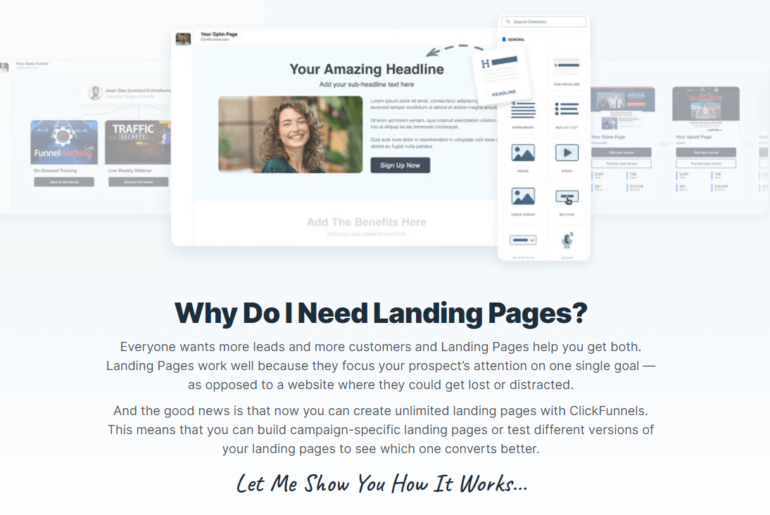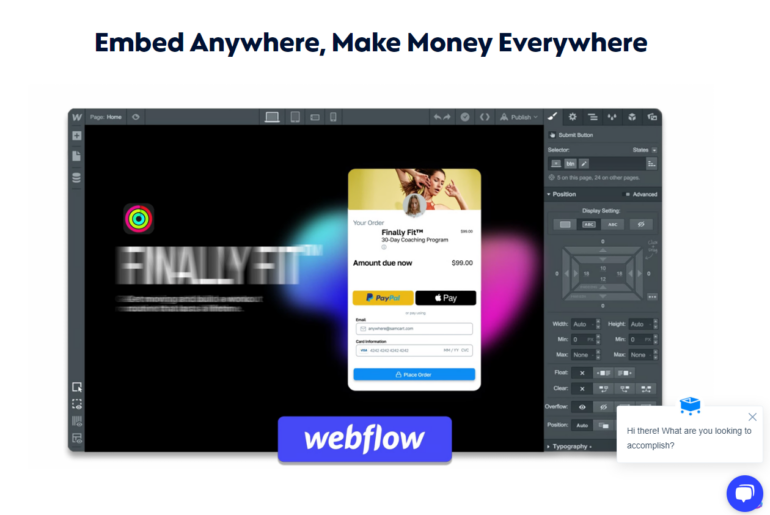An app allows businesses to efficiently gather, analyze, and use customer data to improve their services. It can also function as a convenient platform where you can build better and stronger customer relationships.
If you are looking for an easy way to create a custom app, look no further than the best no code app builder. As the name suggests, these tools require no coding knowledge, so anyone can use them to their advantage.
A Quick Comparison of the Best App Builders
There are a number of app builders out there you can use even with little to no coding or programming skills. This makes them ideal for anyone who wants an app for their business but doesn’t have the time or skills to learn how to code.
To help you find the app builder that fits your needs, here are today’s top recommendations:
| No-code App Builder | Pricing | Free Trial / Version? | Most Notable Features |
| Appypie | Starts at $12 per month | ✓ | User-friendly interface Website and app builder Chatbot builder Store integration |
| Kintone | Starts at $24 per month | ✓ | Centralized database Simple app development Customization options Accountability |
| Adalo | Starts at $45 per month | ✓ | Frontend-oriented Multiple integrations Adalo App Academy Page linking Dynamic actions |
| Thunkable | Starts at $13 per month | ✓ | Advanced Logic Modules Drag-and-drop interface |
| Wix App Builder | Starts at $29.99 per month | ✓ | Detailed analytics Online store Wix app and website sync |
| Jotform Apps | Starts at $34 per month | ✓ | Plenty of templates Unlocked features |
| Glide | Starts at $25 per month | ✓ | Spreadsheets Drag-and-drop editor Extensive templates library |
| Bubble | Starts at $25 per month | ✓ | Cross-platform Analytics SEO strategy Security |
| QuickBase | Starts at $600 per month | ✓ | Dynamic form rules Pre-built apps |
| Google Appsheet | Starts at $5 per month | ✗ | Automation Multi-platform support Templates |
Best No Code App Builder
While no code tools follow almost the same principles, each has its own distinct features that make it unique from other platforms. To get a clearer picture of what to expect from these no code apps builders, take a look at our list to find which one suits your business.
1. Appypie
As an excellent platform for mobile and software development, Appypie is one of the best no code tools for small and medium-sized businesses. In fact, this no code platform is highly reputable, with numerous nominations and awards backed up by over 10 million customers.
Key Features
If you want to create a simple application but can’t afford to go over budget by hiring a developer, Appypie is the answer. Here’s why this no code app builder is a favorite among small and medium-sized businesses:
- Easy-To-Use Interface
Appypie has an incredibly user-friendly interface, so you can easily find what you need to create an eye-catching dynamic application. To get started, you simply enter the name of your business and choose a category, device, and color scheme.
- Website and App Builder
In addition to being a custom app builder, Appypie also lets you create a website for your business. As you can imagine, having both these functionalities in one platform will save you time and money.
- Chatbot Builder
Have you ever seen those chatbots that automatically pop up once you open an app or visit a website? This powerful tool will undoubtedly take your customer’s experience to the next level. If you want the same for your business, Appypie can help make that happen.
Appypie has a neat feature that lets you create your own chatbot to help guide visitors into answering queries. You’d be able to interact with your app’s users, ensuring they get to have a better user experience.
- Store Integration
Appypie lets you connect your existing store to various platforms, including Etsy, Shopify, and Magento. You can even set up your app in a way that allows users to directly pay through Appypie, creating a smooth and seamless transaction.
Pros:
- Excellent customer support system
- Doesn’t require any coding knowledge
- Secure payment methods
- Can be used offline
- Wide selection of templates
Cons:
- Lacks a web view button on the main menu
- Limited upgrades
- UX appears somewhat “clunky”
Pricing
Appypie offers a seven-day free plan to anyone who wishes to try out its no code tool. This way, you can decide whether or not to avail of any of Appypie’s paid plans.
- Standard
Its most affordable plan starts at $12 per month and is perfect for individuals who enjoy the automation features of Appypie. You’d have 40 connects, five-minute app runtime intervals, five premium apps, filters, formatting tools, data security, email, and live support. Using this platform alongside the best email marketing service will no doubt boost your business.
- Professional
If you plan to take your business to the next level, this $30-per-month plan is the right upgrade. Aside from the standard features, you will receive unlimited connects, two-minute runtime intervals, unlimited premium apps, auto replay function, and selected app support.
- Business
Once you are managing a team, you may opt for the $75-per-month Business Plan. In addition to the features of the Professional Plan, you’d have one-minute runtime intervals, VIP support, and Teams function.
- Enterprise
To fully unlock everything Appypie offers, you can avail of the Enterprise Plan by contacting the platform’s support team. Additional features you will receive include a data security officer, account manager, data retention, account capture, and other security features.
2. Kintone
If you are looking for an all-in-one, no-code platform that prioritizes team collaboration, Kintone might be the right choice. This is a great tool for software developers and engineers to effectively strategize and create no code apps, databases, and automation for businesses.
Key Features
One of the selling points of Kintone is its no-code interface that enables users with no coding knowledge to create powerful apps.
- Centralized Database
The main goal of Kintone is to unify everything into one database, which it successfully implements. You will have the data, conversations, and tasks available in one database, improving work productivity and reducing the hassle of switching to another platform.
- Customization Options
Kintone is great when it comes to providing external options that allow customizing workspaces depending on the preference and need. You can ensure your team has a custom-fit workflow, helping them meet the company’s goals.
- Accountability
As one of the best project management tools, Kintone allows businesses to create accountability measures for their employees. You use it to keep track of the tasks, progress, and changes that occur in the projects of different departments.
Pros:
- Excellent customer service
- Reports and analytics
- Role access assignment
- Versatile tool
- Converts sheets into apps
Cons:
- Can’t be used offline
- Commenting system is basic
- Freemium plan has no subtask function
- No free plan after trial
Pricing
Kintone has an initial 30-day free plan to get you and your team to try out its awesome features. During this period, you will have full access to the platform’s database, workflows, and other unique options. Once the trial is over, Kintone will delete all of your data unless you avail of its paid service.
- Monthly Subscription
Kintone has a $24-per-month subscription fee that has all the features unlocked. The catch is that each team member must pay $24 on top of the five minimum member requirements.
3. Adalo
If you are looking for a no-code platform that can create apps to be published on the web or mobile, Adalo is the answer.
Key Features
Adalo is insanely flexible, letting you create apps through its frontend-oriented design, which means that it doesn’t require you to know any coding knowledge.
- Frontend-oriented
Adalo has a simple drag-and-drop frontend feature, helping you see your idea come to fruition. While you create your design, it uses the on-page logic, which is essential to trigger backend events.
- Integrations
While Adalo doesn’t allow you to use backend logic in creating apps, you can use third-party software with backend capabilities. If you already have an existing API, you can use Adalo as a front-end.
One of its most powerful integrations is with Zapier, which lets you trigger an action with over a thousand supported apps.
- Adalo App Academy
Adalo will guide you in creating the perfect application for your business with its unique set of courses. It will guide you from app building, design, and marketing to business strategizing, increasing your chances of growing your company.
- Page Linking
Creating app pages is a breeze with Adalo because you can make fun transitions and animations from its list of options.
- Dynamic Actions
Adalo’s database is automatically updated and recorded whenever a user clicks a button in its mobile app. The app also automatically sends push notifications to specific users, allowing them to interact with your application more.
Pros:
- Web and mobile app support
- Modern and sleek element design
- Easy-to-use interface
- Frontend and backend capabilities
- Allows creating custom templates
Cons:
- Limited design options
- Slow apps
- Apps don’t fit all mobile devices
Pricing
Adalo has flexible pricing plans that will fit any business size. As you grow your business, you can gradually scale it up to unlock more features.
- Free
You can start using Adalo without spending any cash. The free plan offers a ton of features, including web publishing, unlimited testing, and a built-in database.
- Starter
Available at $45 per month, you’ll be able to publish your app to your custom domain and in Google and Apple App stores. You will also unlock using push notifications to alert your customers through their mobile phones.
- Professional
At $65 per month, you’ll have access to the version history of your app, which is essential if it encounters any issues and needs investigation. The pricing plan also allows you to have access to your customer’s geolocation, which is crucial if you want to know customer data.
- Team
As your business grows, you can avail of the Team Plan at $200 per month, which lets you create up to five published apps. It will also improve your email ticketing system to only one day SLA, resolving issues at a faster rate.
- Business
At $250 per month, you can publish up to 10 applications with unlimited app collaborators.
4. Thunkable
If you’re looking for a fun way to incorporate your idea into an app, Thunkable has the solution. It has a colorful interface and different features that users and developers enjoy. You will start with a blank canvas and then build your apps without having to go through templates that restrict your imagination.
Key Features
Because of Thunkable’s Advanced Logic Modules, it’s not surprising it is preferred by many over other no code platforms.
- Advanced Logic Modules
The Advanced Logic Modules give you the opportunity to create complex apps through a simplified coding structure. By letting you add conditions to every user input, data, or time, you can customize how your app behaves.
- Drag and Drop Interface
Through the drag-and-drop design canvas, it’s easier to create native mobile apps because you can do it on many supported devices. At the same time, you will learn the language as you design and build apps.
Pros:
- Colorful UI
- Native app support
- Easy learning curve
- Excellent support team
- Complete freedom
Cons:
- Limited customization
- Limited math functions
- Starts with a blank canvas
- No templates
Pricing
The pricing structure of Thunkable is quite remarkable, as it has different choices for individuals and businesses.
- Free Plan
The Free Plan is perfect for individuals planning to use it for minor projects, mainly for personal use. It has a 200MB storage limit with a maximum of 10 projects, perfect if you are testing out the capabilities of Thunkable.
- Starter Plan
At $13 per month, you can enjoy the perk of having your projects set in private. You will also enjoy 500MB storage with a 20-project capacity.
- Pro Plan
The Pro Plan allows you to publish unlimited mobile apps and two web apps for $38 per month. You won’t have a project limit, so you can create a mobile app, publish it, and try again.
- Business Plan
At $167 per month, the Business Plan will give you unlimited access to every feature and build up to five web apps. This is perfect if you plan to create an eye-catching web and native mobile app.
- Team Plan
Compared to the Business Plan, you have an additional collaboration feature wherein you can work with your developers. To avail of this plan, contact their support team to know about the pricing.
- Custom Plan
If you know what exact features you need, you can ask Thunkable to craft a Custom Plan for you. Not only will you get the value of the platform, but you will also save up cash because you’re guaranteed to use the features you pay for.
5. Wix App Builder
The Wix App builder is the perfect platform to create mobile apps if you already use the Wix website. While most know Wix as a website builder, existing Wix users can also use it to build apps.
Key Features
As a Wix website user, you can further elevate your reach to a bigger audience by building native mobile apps.
- Analytics
Your Wix dashboard can track user analytics in real-time, helping you perfect your marketing strategy using data. You will have access to the number of visitors, purchases, views, retention rates, downloads, and other important stats for your business.
- Online Store
Wix enables both the business and consumer to comfortably enjoy the online store. As a business owner, you can effortlessly upload product images and inventory. Consumers can purchase a product on the app and view real-time updates on its condition and delivery.
- Wix App and Website Sync
As an existing Wix website user, creating an app isn’t only the perfect way to increase reach; it can also sync perfectly with your website. This feature is a game-changer since you can easily copy the layout of your website, and the app syncs perfectly with your web page.
Pros:
- Live chat
- Real-time analytics
- In-app payments
- Marketing campaigns
- Creative freedom
Con:
- High pricing
Pricing
Wix offers flexible plans that will depend on your target users, either through Google or the Apple App store.
- Free
The Free Plan allows you to use the base features of your Wix website on your app. You also get to preview the app to test it out. If you think it doesn’t fit your requirements, you might be better off getting a paid plan.
- For Android
At $29.99 per month, your app will be available on all Android devices, and users can download it in the Google Play store. You will enjoy customized notifications, and the app can also send push notifications to the user.
- For Apple
It has similar features to the Android plan, but the app is available in the Apple App store for $29.99 per month.
- Premium Plan
The Premium Plan allows your app to be available for download at both the Apple and Google Play Stores for $49.99 per month.
6. Jotform Apps
Jotform is another no-code platform that uses the drag-and-drop feature that lets you build apps effortlessly. The biggest kicker that users love about Jotform is that it is easy to use, and all of its features are unlocked for free.
Key Features
It’s understandable to have a really tight budget at first when starting a business. With Jotform, you’d be able to give your consumers the full experience by creating a customized app free of cost.
- Templates
Jotform makes building an app quick and easy by offering over 200 templates. These templates are divided into categories supporting specific businesses. You will find templates designed for healthcare, eCommerce, education, and so much more.
- Unlocked Features
Another feature that impresses Jotform users is the fact that all essential tools are unlocked for free. You can readily create forms and apps without worrying about spending a single dime. On the other hand, paid plans are only needed if you need more space, forms, or other fields for your app.
Pros:
- Pre-built templates
- Easy to customize
- Flexible pricing plans
- Easy to navigate
- Payment gateway compatibility
Cons:
- Limited integrations
- Slow customer service
- Unexpected crashes
- Delayed or rejected emails
Pricing
While Jotform emphasizes its Free Plan, there are other pricing plans available on the platform.
- Starter
The Starter Plan is completely free and comes with all features unlocked. The drawback is that the forms are limited to five, the storage is only 100MB, and the monthly payment submissions are limited to 10.
- Bronze
At $34 per month, you’d have 1GB available space, 25 forms, and up to 100 payment submissions.
- Silver
At $39 per month, you will further increase your storage to 10GB, 50 form limit, and 250 monthly payment submissions. As advertised, this plan has the best value if you wish to pay for a Jotform subscription.
- Gold
At $99 per month, you can receive 1,000 payment submissions and have a 100-form limit for your business app.
- Enterprise
The Enterprise Plan has all unlimited features available, with added priority support and local data residency to protect your information. You will need to contact Jotform’s sales team to discuss the pricing.
7. Glide
If you are familiar with Google Sheets, Glide has options for you to create functioning apps without coding skills. At the same time, if you wish to make app changes, simply edit the data in your Google Sheets and reload your app.
Key Features
Similar to other no code tools, Glide has a drag-and-drop editor to help users effortlessly create software.
- Spreadsheets
A neat feature of Glide is that you can use the Spreadsheet function to do trial and error when creating functions for your apps. Even with little tech knowledge, time and continuous testing will let you get the hang of things eventually.
- Templates
Glide has more than 400 built-in templates to help you get started in customizing your business application. You can choose one that fits your business, such as CRM, eCommerce, and landing pages, and develop it depending on your needs.
Pros:
- Wide selection of templates
- User-friendly
- Easy to deploy apps
- App progress can be saved and continued
- Cross-platform app deployment
Cons:
- Not suited for multi-functionality
- Limited themes and templates
- Has a noticeable Glide tag for free versions
Pricing
Glide has flexible pricing options that allow you to choose what suits your business.
- Free
Glide has a free option so that you can create your first few apps at no charge. Once you’ve built up to three apps and pages, you can try out their paid versions.
- Starter
The Starter pack is available at $25 per month and will allow you to create up to five apps and web pages. You will also receive 5GB of storage so that your progress won’t be deleted.
- Pro
The Pro version is perfect if you have a small team. Priced at $99 monthly, you can collaborate on projects and create unlimited apps and web pages.
- Business
At $249 per month, your team will have access to 1TB of storage. You will receive amazing safety features, and an expert will guide you in navigating the platform.
8. Bubble
Bubble has an incredibly easy-to-use interface and drag-and-drop features. It is one of the best no code tools that total beginners can easily navigate.
Key Features
With millions of users, Bubble prides itself in helping startups and small businesses grow their reach. You can take advantage of its user-friendly features to create an app that showcases your brand.
- Cross-Platform
Bubble is one of the trusted no code development platforms compatible with all operating systems. With the platform, you can easily create applications without restrictions and publish them on Google and Apple App Stores.
- Analytics
With its analytics tool, you will have the information needed to know what works and what doesn’t. This way, you can build and edit your app to ensure it meets the needs of your consumers.
- SEO Strategy
Bubble helps you create SEO-friendly strategies to help your business gain more attention. Some of the SEO tools that Bubble offers are site maps, unique page URLs, optimized content, and so much more.
- Security
This no-code platform takes care of your account by offering multi-factor authentication, giving you another layer of protection. It enables you to gain more trust in Bubble as you focus on mobile app development.
Pros:
- Smooth drag-and-drop builder
- App capacity scales with growth
- AWS cloud database hosting
- Easy workflow editor
- Web development compatibility
Cons:
- Limited element customizations
- Shared-server hosting
- Web apps are saved locally, not on the cloud
- No offline features
Pricing
Bubble has flexible payment schemes you can avail as your business grows.
- Free
While the Free version contains all core features, you won’t be able to publish the live version of your app. The upside is that if you like the results of the free version, you can opt for a paid plan.
- Personal
Upgrading to the Personal plan will set you back $25 per month and allow you to run a live version of the app. The best features of this plan are that you will have a custom domain and gain access to Bubble’s email support team.
- Professional
At $115 per month, your business can enjoy a server capacity of three units, two application editors, and two development versions.
- Production
If your business has received that much growth from Bubble, you can further increase some of its capacities with this $475 Production plan. Its most noticeable upgrades are 10 server capacity units, 15 application editors, and up to 20 development versions.
9. QuickBase
Creating an app without knowing how to code might seem daunting at first. However, with a no-code platform like QuickBase, it becomes a breeze.
Key Features
QuickBase works on the principle of simplicity and ease of use. Not only will it help you create an app for your business but also ensure you enjoy the process.
- Dynamic Form Rules
QuickBase has a form-based automation tool that uses low-code technology to automatically execute commands. It works by applying logic commands, which are easy to learn.
- Pre-built Apps
Along with the drag-and-drop interface, you can use a wide variety of pre-built apps to add to your convenience. That said, even with the pre-built apps, this platform might not be for everyone because of its limitations. For instance, it isn’t suitable for specific applications, such as creating a shopping app or a news app.
Pros:
- Easy to navigate UI
- Pre-built apps
- App wizard and tutorials
- Third-party app integration
- Workflow management tools
Cons:
- Lacks native mobile app development
- UI is outdated
- High pricing options
Pricing
While you can test out QuickBase via its free trial, you will need to avail of a paid version if you have a larger team.
- Team
At $600 per month, QuickBase allows you to create up to 50 customizable apps for your business. Included in the package are workflow automation, app and data integration, licensing options, and mobile-ready applications.
- Business
If you need more security functions and advanced features, the Business plan is available at $2,000 per month. You can create 100 customizable apps along with audit logs and offline availability.
- Enterprise
The Enterprise plan allows you to create a custom-fit platform that completely addresses your needs. Contact QuickBase’s sales team to know more.
10. Google AppSheet
Appsheet is a Google platform that allows you to create the best no code apps with ease. It is cloud-based and allows you to use a visual editor to create reports, forms, and automation.
Key Features
The best thing about Google Appsheet is that you can use it on any device such as a computer, tablet, or mobile phone.
- Automation
The Google Appsheet makes task automation possible for businesses, such as with user alerts and approval of orders. It is also powerful enough to create bots and execute commands based on the input.
- Multi-Platform Support
With Google Appsheet, you can create Android apps, iOS apps, and web apps. It can also help you create apps that work even when the user is offline.
- Templates
Google Appsheet has a wide selection of templates, so you can get started without having to build from scratch. After choosing one, you can start customizing the app to suit your liking.
Pros:
- High-quality templates
- User-friendly UI
- Workflow automation
- Works on mobile and web
Cons:
- Limited customization
- Enterprise-focused, not personal
- Advanced features are locked in a paywall
Pricing
Compared to the other platforms, the Google Appsheet is incredibly affordable. While it doesn’t have a free plan, the paid pricing plans are cheaper than expected.
- Starter
The Starter plan is available at $5 per month, and you’ll have access to automation features. You can connect to Spreadsheets and upload them to the cloud with ease.
- Core
At $10 per month, you will have advanced automation and application features, security controls for your application, and access to a reliable email support team.
- Enterprise Standard
The Enterprise Standard unlocks team management controls, creating machine learning tools and priority in its customer service. You will need to contact its sales team to know more about the price.
- Enterprise Plus
The Enterprise Plus contains all the features of the Enterprise Standard plan, but it has an additional governance control feature.
Creating An App With No Coding Experience
All tools listed have unique qualities that will suit different business owners. It’s safe to say you won’t be disappointed with these no code tools, as each has its own strengths and weaknesses.
Some businesses may find specific no code tools attractive since it has the features they need. For us, the best no code app builder is Appypie. It is beginner-friendly and easy to use and lets you create simple and complex apps.
No Code App Builder FAQs
1. What is a no code app builder?
A no-code or zero-code app builder is an innovation wherein the backend development process is combined with the front-end design. The backend development serves as a rigorous aspect that requires coding skills, but no code platforms allow you to skip this process.
In simpler words, the coding aspect is already built into the platform. Your task is to create the best-looking app with the elements within your grasp.
2. Are no code app builders worth it?
If you’re planning to develop simple web or mobile apps, a no-code platform is definitely worth it. That said, it’s also possible to face certain limitations because you’re restricted by what these no code platforms can do.
As such, there may be times when you have to ask for the help of someone with technical skills in coding to transform your vision.
3. How long does it take to develop an app?
Developing an app isn’t as simple as it seems on the surface. You will have to create a feature and requirement list of what you will need.
Small apps take around three to four weeks, mid-sized apps at six to seven weeks, and big-sized apps that are more complex take about nine to 10 weeks to complete. The timeframe involves building the app, testing its features, beta testing, and development.
4. What are the benefits of no code app building platforms?
No code development platforms offer a lot of convenience to those who know and do not know how to code.
- Speed
It is faster to create custom apps from the tools available in these no code platforms instead of manually coding the design.
- Cost
Hiring developers isn’t cheap because they have years of coding knowledge to plan and build apps. The best no code platforms already have what you will need in designing an app while being only a fraction of the cost of a developer.
- Communication
Communication barriers (technical or language) between business users and developers can restrict software development. With the easy-to-navigate interface of no code app builders, you can design apps without the trouble of explaining every detail of your concept.
- Testing New Ideas
The drag-and-drop interface of most no code platforms allows you to experiment and test ideas without talking to a developer. Some of the platforms on our list have the best drag-and-drop features that allow you to effortlessly test your app ideas.
5. How much revenue can mobile apps generate?
When an app creates a great user experience, it can attract a larger audience. With a big market size, the potential revenue for businesses with mobile apps can reach millions. The best businesses today take advantage of digitization and are among the biggest players in the market.
6. What is the difference between no code and low code development platforms?
No code platforms completely allow you to skip the coding aspect of designing mobile and web apps. Low-code development platforms work the same way as no code, but it offers flexibility by letting you add your own custom code.
7. What apps can I build with an app builder?
While most platforms work on the principle of creating a visual interface with drag-and-drop blocks, it will depend on the features of the app builder. Typically, no code tools have templates you can use as a guide to creating a mobile or web app that represents your brand.






